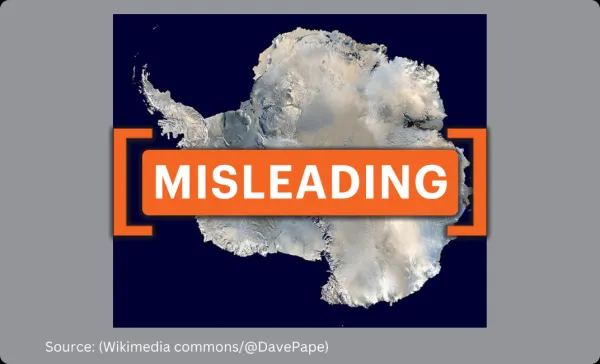By: Arron Williams
July 7 2023

Data has indeed shown that the Antarctic ice shelf has grown. However, Arctic ice is melting, and global warming is a contributing factor.
Context
Social media users have claimed that Antarctic ice has grown rather than melting as predicted, which is therefore evidence that climate change is fake or does not negatively impact the planet.
One Instagram post claims that a recent study shows that the ice shelf in the Antarctic has grown by 5,305 sq km from 2009 to 2019, and further states: “In 2007, Al Gore told us Arctic sea ice levels were ‘falling off a cliff.’ He was completely wrong.” It includes a video depicting snow and ice in the Antarctic and Greenland to suggest that ice has not melted as Al Gore had stated.
Both Arctic and Antarctic ice shelves are referenced, and it is important to distinguish between the two: the Arctic refers to the northern landmass at the tip of the globe, while the Antarctic is the southern tip.
In Fact
It is true that a 2023 study, published in the scientific journal Cryosphere, found that overall the Antarctic ice shelf has grown by 5305 sq km since 2009. Not all ice shelves experienced growth. 18 ice shelves retreated, and 16 larger shelves grew in the area. However, this does not mean that the Arctic ice in the north is unaffected by climate change, or that global warming has had no impact. The study itself does not refute climate change; it is merely an analysis of change in Antarctic ice.
Growth in ice around the Antarctic is not a new discovery or observation. According to NASA’s Earth Observatory, satellite data from 1979 to 2014 shows that Antarctic sea ice increased by about 1 percent each decade. While sea ice has increased in the eastern Ross Sea sector, it has decreased in the seas around the Antarctic Peninsula, leading NASA to conclude that “Antarctic sea ice shows a nearly flat trend.” Furthermore, according to Euronews, another study mentions that growth in Antarctic ice shelves is potentially caused by changing wind conditions that pushed floating sea ice into the ice shelf, causing the ice to bind together.
The Instagram post attempts to refute Al Gore, but the included audio clip of Gore speaking mentions the “North polar ice cap,” which refers to the Arctic rather than the Antarctic. The Arctic ice has been in a state of decline since 1978, as observed by NASA’s Earth Observatory satellites. The decline “cannot be explained by natural variability alone,” with rising global temperatures also contributing to the melting of “greater amounts of Arctic sea ice.” NASA is emphatic that global warming is melting Arctic sea ice. The National Oceanic and Atmospheric Administration (NOAA) also monitors these regions and states that Antarctic trends are less apparent, unlike the Arctic, where sea ice is declining in all areas.
Scientific American reports a similar trend is observable in Greenland, where the ice sheet may be more sensitive to global warming than previously thought. Rising air temperatures and warmer oceans are contributing to an increased melting speed of Greenland’s coastal glaciers. Without global warming and increased atmospheric temperatures in the last decade, glacial melt would likely have been reduced by “as much as a third.” NASA’s GRACE mission has also gathered satellite data about Greenland and the Antarctic, and it suggests that the Greenland ice sheet is losing about 270 billion tons of ice yearly, while the Antarctic is losing 150 billion tons yearly. This melting of ice contributes to rising sea levels.
The impact of climate change on sea ice is observable. While there are observations of ice growth and fluctuating trends, the overall trend in the Artic is that sea ice is in decline due to rising temperatures.
The Verdict
While it is true that a recent study’s findings suggest that the Antarctic ice shelf has grown, this does not mean that climate change has had no impact or that ice is not melting. It is also important to note that the Arctic and Antarctic are two different areas that may cause confusion in reading statistics due to the similarity in names. Therefore, we have marked this claim as misleading.